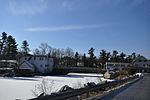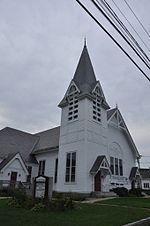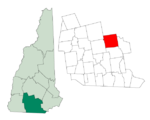WLMW
American Family Radio stationsChristian radio stations in New HampshireManchester, New HampshireNew Hampshire radio station stubsRadio stations established in 1997
WLMW FM 90.7 is a Christian radio station licensed to Manchester, New Hampshire, and owned by Knowledge for Life. WLMW airs programming from American Family Radio as well as some local programs. Al Kaprielian is the station's on-air meteorologist.
Excerpt from the Wikipedia article WLMW (License: CC BY-SA 3.0, Authors).WLMW
Mountain Trail,
Geographical coordinates (GPS) Address Nearby Places Show on map
Geographical coordinates (GPS)
| Latitude | Longitude |
|---|---|
| N 42.983055555556 ° | E -71.590277777778 ° |
Address
Mountain Trail
Mountain Trail
03045
New Hampshire, United States
Open on Google Maps









